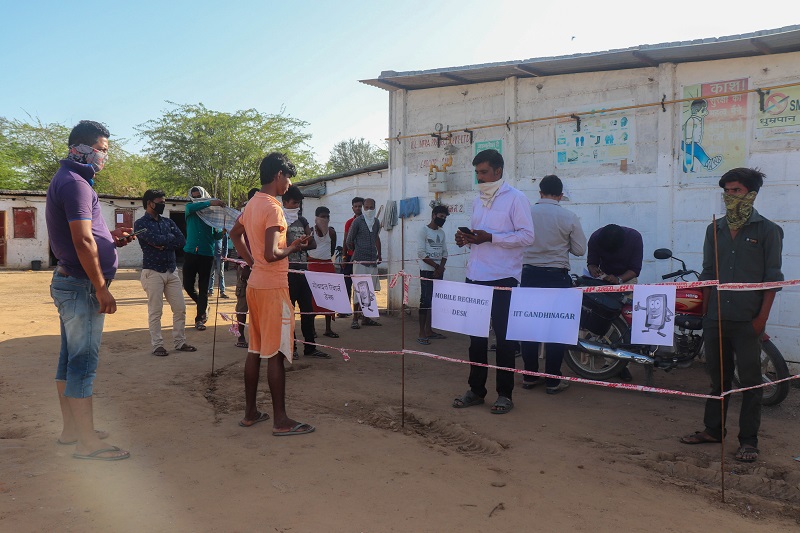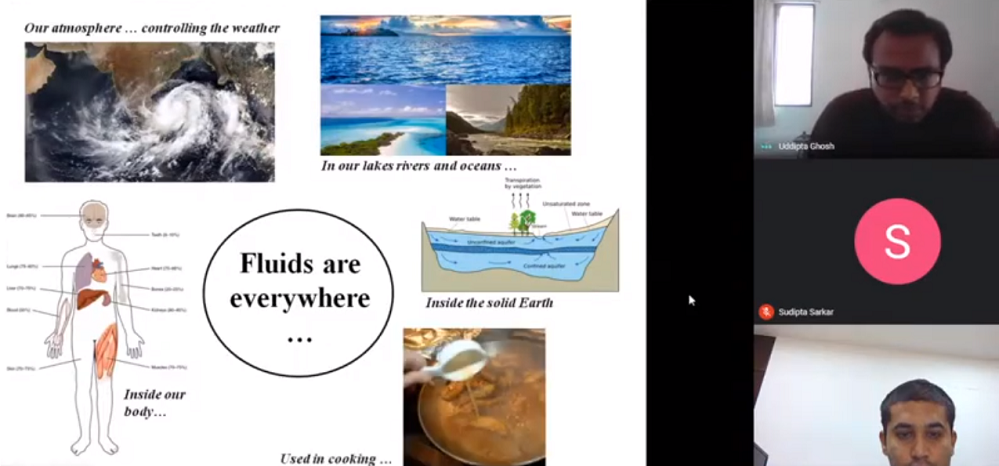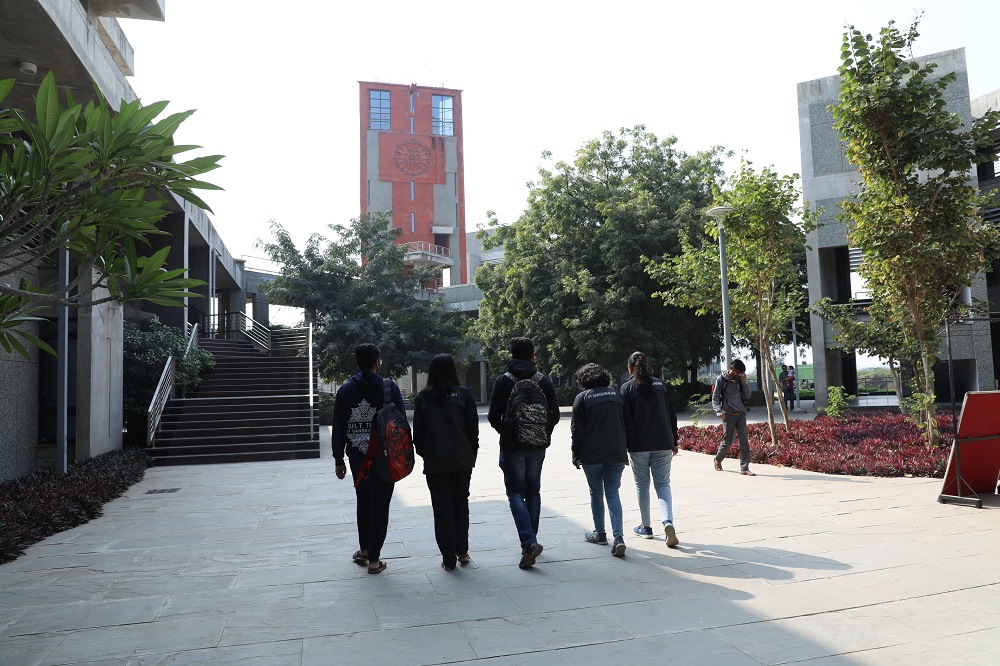“The power of togetherness is the greatest power of all.” – Iti Rawat, founder of Women Entrepreneurs For Transformation
With 69,92,010 infected cases and 4,03,128 deaths across 216 countries, areas and territories (according to the World Health Organization, as of 9th June 2020, 4:30 PM IST), the novel coronavirus disease is engulfing the world at an alarming pace. Governments, health agencies, and various organizations across the globe are doing whatever they can to limit the spread of the notorious SARS-CoV-2.
Recently, Dr. Vasco Matos Trigo (a science journalist for more than 20 years, former Head of Communication and Multimedia Office at the University Institute of Lisbon and Scholar-in-Residence at IIT Gandhinagar) had a conversation with Dr. Sudhir K. Jain (Director of IIT Gandhinagar, a professor in the Civil Engineering discipline and former professor at IIT Kanpur) on how the Institute effectively tackled the challenges posed by this pandemic.
Prof. Jain said that the COVID-19 crisis is a much bigger problem than, for instance, an earthquake. Since its initiation and global expansion, it is adversely affecting the lives of people on a drastic scale. Talking about the efforts made by the Indian Institute of Technology Gandhinagar to cope with this viral illness, he stated that there was a lot of resilience in the system from the start. The students, faculty, and staff of this organization were healthy and this helped the IITGN family to stand firmly against these tough times.
“We had never anticipated that we would face a crisis of this sort but we were well prepared in terms of our health, teamwork, culture, and relationships. We had some assets that proved to be very valuable in tackling this situation,” he added.
Students First
“When this crisis unfolded, there was a lot of panic and anxiety in our student body about what would happen next. We had very frank discussions with them during which I emphasized that their hostels are their home and they would not be asked to vacate their rooms. But if they feel that they should return home, they can definitely do so. Eventually, about 25% of our students stayed on the campus during the peak of the nationwide-lockdown implemented by the Government of India. We strictly followed all the preventive measures and ensured that every member of the Institute family remains safe,” he discussed further.

Even now, no one is fully aware of the nature of this crisis. Some big questions that IITGN faced were – how will it be able to feed its inmates safely throughout the lockdown? How will everyone overcome these challenging times? The Institute started with organizing dry-rations of food materials in the mess storage. This would enable it to feed its family for two months in case of non-availability of food raw materials in the market.
According to Prof Jain, “I received feedback from many parents where they said that their children were more protected and more comfortable living on the campus than they would have been in their homes. The conditions of many towns and cities across the country are not good. Every day in the news, we hear that the number of positive cases is constantly rising. In such a case, this Institute is providing them a safer place to live.” IITGN is a Students First Institute. It has always prioritized the health and progress of its students. This case is no different. The sole objective is to fight this grim situation together (students, faculty, and staff alike) and everyone on the campus is doing their best to deal with this problem in a positive manner.
As an active response to these grave times, the IIT Gandhinagar students created a Control Room. The aim of this student-driven initiative was to help the Institute community 24×7 in coordinating activities ranging from proper implementation of safety measures, prevention, quarantine, and isolation, all the way to arranging provisions for medicines and other essential services inside the campus. “Basically, our students being on the campus made a huge and strong difference not only for them but also for the Institution as a whole,” he expressed.

Understandability Among Workers
The Institute was successfully able to work with its mess workers, laundry services, housekeeping team, and food vendors during different stages of the lockdown. The shops and outlets inside the campus premises functioned by following all precautionary norms to ensure that the IITGN community had safe access to all the essential services. “In order to contain the spread of this disease, the entry and exit protocols of the campus were made stricter. We also provided financial incentives to the workers, on top of their salaries, if they agreed to stay with us on the campus during the lockdown days. We received a largely positive response. Our workers understood the urgency of this situation and took a step forward. Basically, we all helped each other,” Prof Jain explained.
These workers were provided with hygienic rooms and sanitized washrooms, healthy environments, balanced-diet meals four times a day, and all the basic amenities they would need during their stay on the campus. Moreover, they were also given some facilities to combat their boredom like access to televisions, games, and so on.
IITGN also focused on taking care of about 900 construction workers associated with it. It understands that they are the most vulnerable during these times and therefore, special emphasis was placed on ensuring their health and wellbeing. Shramik Kalyan Samiti (Workers Welfare Committee) was formed with the motive of taking care of these people. The Institute raised some money from donations that it utilized to cater to the basic needs and provide required medical assistance to the construction workers. Other activities were also carried out such as recharging their cell-phones for voice calls, messages, and data so that they could remain connected with their near and dear ones. “We completely respected and supported them in their decision of going back to their families or staying at the campus,” Prof Jain continued.
Efforts By Faculty
Online modes of working are the means to make sure that the world is academically and professionally functional while strictly practicing the rule of social (physical) distancing. One of the greatly praised things done by IIT Gandhinagar was that it did not change its mode of education to online suddenly. The students, as well as faculty, were not prepared for this drastic change since, in the pre-COVID-19 world, a large chunk of the education was imparted offline. Instead of throwing everyone off guard, the Institute delayed the semester and announced that it would resume its academic activities from 8th June 2020. Summer vacations were declared from the later part of March till the start of June and everybody utilized this time to prepare themselves for these online activities.

“I think that changing the mode of education requires some serious preparations and this is exactly what IITGN did. We organized workshops on various methods of online classes. Some of our faculty members, who had taught online classes in the past, shared their experiences with others so that our upcoming activities could run smoothly. We also reorganized our hardware and infrastructure accordingly. I feel that these two months gave space to our faculty to do some introspection and think rationally on how they can effectively teach our students in the best possible ways amidst this pandemic,” he expressed.
The Institute faculty also helped in starting Project ISAAC. It derives its inspiration from 350 years ago when Isaac Newton, a student at Trinity College (Cambridge), found himself confined to his home during the Great Plague of London. During this time, he developed some of his most profound discoveries. Along similar lines, IITGN encouraged its students, through this project, to utilize their forced confinement (because of the coronavirus infection) to dream ambitiously and pursue their hobbies and passions, such as painting, coding, writing, and creative expression, to name a few, by introducing some exciting and fun challenges. These activities focused on honing their critical skills, a factor absolutely necessary for professional success. Furthermore, a Virtual Seminar Series was also started by the professors. It is an online program initiated as a means to actively engage both students and the general public so that they can explore and learn about a diverse range of topics from different domains and fields in an interesting manner.

Management Groups
Prof Jain described that his first decision was the establishment of a Crisis Management Group, consisting of three faculty and two staff members. The objective was to keep a sharp eye on all the developments happening at IITGN in the wake of the current pandemic.
On the basis of this information, their job was to provide advice, guidance, and suggestions on what the community should do next. As a result, this group organized many meetings and discussions and started making preparations accordingly. The Control Room was created based on one of their suggestions.
This was followed by the initiation of a community-driven Special Volunteer Force that effectively coordinated with the vegetable and fruit vendors and grocery stores so that they can provide the basic services to people right at the campus. The community members did not have to leave the Institute premises to get their things of need – such amazing was the work of this group!
“The success of all these efforts has demonstrated how well our family can function and handle such crises if they are given enough space,” he stated.
A Responsible Campus
The idea of remote-working was greatly implemented for the Institute staff to the maximum feasible extent so that everyone remains safe and protected. Attending MOOCs (massive open online courses) from external sources was highly encouraged for the student body so much so that the Institute allotted some academic credits to such classes. More than 180 courses were approved for this activity. Moreover, IITGN also created a Welfare Community to work closely with its neighboring two villages – Palaj and Basan. The purpose was to work with their underprivileged and financially weaker sections. Activities like distributing relief materials and providing employment opportunities (such as stitching masks) were carried out as a part of this initiative.

In the end, Prof Sudhir K Jain feels that the world will evolve and overcome this crisis in a very different way. We would have a new normal for everything and it would be different from the old one. Our lives and lifestyles will change greatly. IIT Gandhinagar is a very strong community with positive foundations and Prof Jain believes that it will emerge from this pandemic in a much stronger way. The aspect of equality has been one of its core values and it has greatly strengthened during these times, reinforcing what can be designated as The Spirit of IITGN.
— — — — — — — — — — — — — — — — — — — — — — — — — —— — — — — — — — — — — — — — — — — — — — — — — — — —— — — — —
This article is authored by Apeksha Srivastava. The video of this conversation is available here.

